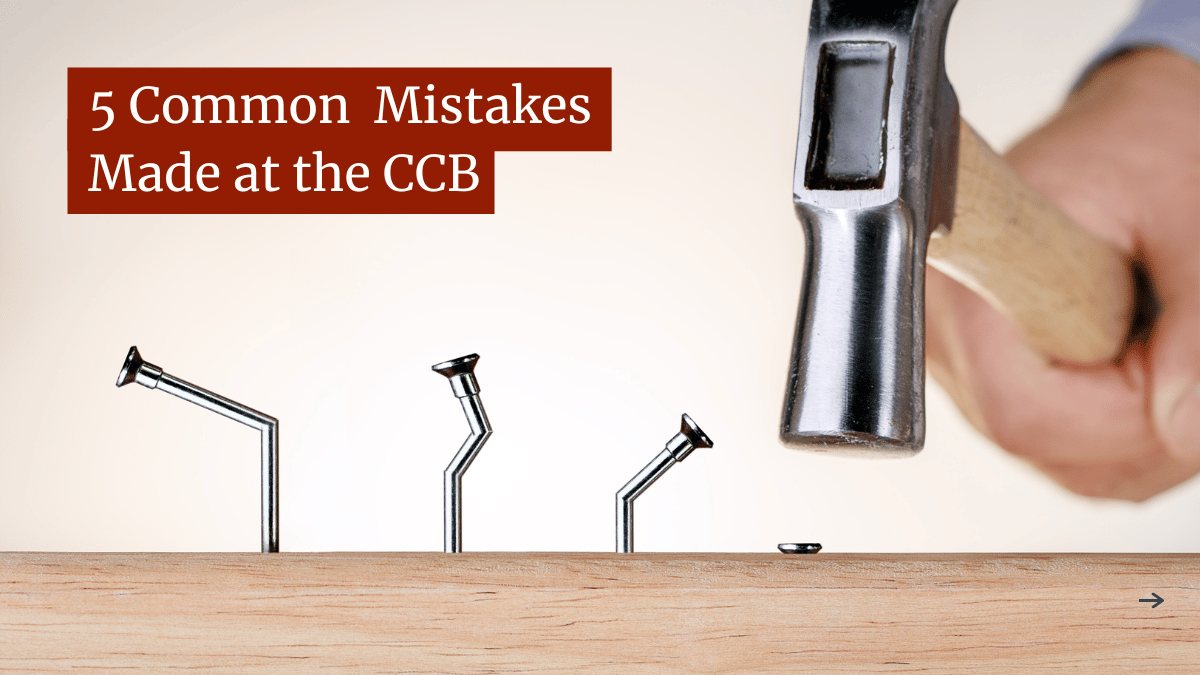5 Easy Mistakes Made by Filers at the Copyright Claims Board

As of this writing, the Copyright Claims Board has just received its 400th case, making some of a milestone for the CCB. That represents a case load of roughly 1.3 cases per day or about 9 cases per week since the CCB’s opening in June 2022
Of those cases, some 218 have already been marked as closed. However, only one of those cases was closed because the CCB rendered a full decision. As I wrote in November 2022, the majority of cases are being dismissed due to non-compliant claims, opt-outs and settlements/voluntary withdrawals.
Many of the cases that were dismissed were clearly not appropriate for the CCB. Many dealt with issues that had nothing to do with copyright, some claims provided little to no information about the alleged infringement, and others simply made no sense at all.
So, while the CCB is meant to be a process approachable by laypeople, that hasn’t really panned out for many that have attempted to use it.
However, even among the stronger cases, some have been challenged or even dismissed for relatively easy mistakes that could have been avoided. Some of these mistakes might seem minor, but have produced unnecessary roadblocks for those filing claims with the CCB.
To that end, here are five of the more common mistakes that filers routinely make when filing with the Copyright Claims Board
1: Using an Invalid Representative
The CCB places restrictions on who can represent a filer in one of its cases. For an individual, the individual can represent themselves, or they can seek the aid of a lawyer or qualifying law student.
However, the issue gets significantly more tricky for businesses. They can be represented by a lawyer, qualifying law student, or in-house attorney, or they can be represented by a, “owner, partner, officer, member, or authorized employee of the business or organization.”
While that’s a fairly broad group of individuals, the representative has to be a member or employee of the organization. Several companies used brand protection, debt collection or other third-party services to file their CCB cases and had those cases dismissed because the claimant and representative were two separate business entities.
The simple solution is to ensure that the person listed as your representative can legally fill that role with the CCB.
2: Failure to Serve Respondents
Though most CCB cases are dismissed before the issue of service comes up, it’s important for anyone filing with the CCB to know that they will be required to serve respondents with CCB paperwork should the case get that far.
This can be a major issue from a cost perspective. Though the CCB’s fees are just $100 per case ($40 initially and $60 should the case go before the board), process service costs around $100 per respondent. It can also be a challenge for individual claimants to know how to obtain process service.
Before filing, do your research on the issue of service and line up who you will use for process service. Though the deadlines of the CCB are generous, no one wants to be performing this research on the clock.
3: Targeting Foreign Respondents
The CCB can only be used to target respondents who live or do business in the United States. Many of the cases that have been filed have attempted to target individuals or businesses all over the world.
However, those cases are quickly dismissed as the CCB simply cannot hear them. Though claimants are given a chance to amend the claim, it’s pretty much impossible to do so since the case should never have been heard at the CCB anyway.
The simple solution here is to understand that you cannot use the CCB to target non-US individuals or businesses, and adopt a different approach to handling those cases.
4: Misunderstanding Online Service Provider
Of all the mistakes on this list, this is by far the most easy to understand. The language here is legitimately confusing, especially if you are not already familiar with copyright law.
When filing a claim, a filer has to choose whether any of the respondents are an online service provider. But while that term may sound very broad, it actually has a very narrow meaning in this situation.
An online service provider is, “a provider of online services to store (and make available), refer to, provide access to, or link to material that is available online.” In short, it’s a service like Facebook, YouTube or Twitter that hosts or links to content from third parties.
In short, they are not the direct infringer. Typically, these types of claims only stem from situations where a DMCA notice was filed, and the work was not removed. Just because the company or individual listed as the respondent provides a service online does not mean that they are an online service provider in this context.
As confusing as that is…
5: Not Following Up on Court Requests
Many of the mistakes above are simple ones that, while annoying and frustrating, won’t necessarily derail a valid claim with the CCB. However, minor mistakes become permanent ones if you don’t carefully read CCB correspondence and do exactly what it says.
If you make a mistake or otherwise have an issue with your claim, the CCB will give you a chance to amend the claim and fix the errors. However, many filers simply don’t do that. The CCB requests an amended claim and hear nothing back before the deadline passes. Other times they amend the claim, but not in the way the CCB asked.
So, if there is any takeaway from post, let it be that you should be on the lookout for correspondence from the CCB, you should read that correspondence carefully and comply with it. If you have trouble understanding it, either ask questions via the provided email or seek advice from an attorney.
Bottom Line
Compared to a federal court case, the CCB is many times more approachable by a layperson. However, one still needs a basic understanding of copyright, legal procedure and the language of both.
To be clear, it is very possible for a layperson to use the CCB, but launching a case unprepared is a very sure way to have the case tossed without being heard. Instead, it’s important to take the time to learn about the relevant law, understand what the CCB’s procedures are and make sure that it’s the correct venue.
Fortunately, all that information is available on the CCB website for free before filing any paperwork with the board.
Combine that preparation with watching closely for any correspondence from the CCB and complying with it carefully and you will have gone a long way to having a case actually heard before the board.
Want to Reuse or Republish this Content?
If you want to feature this article in your site, classroom or elsewhere, just let us know! We usually grant permission within 24 hours.
